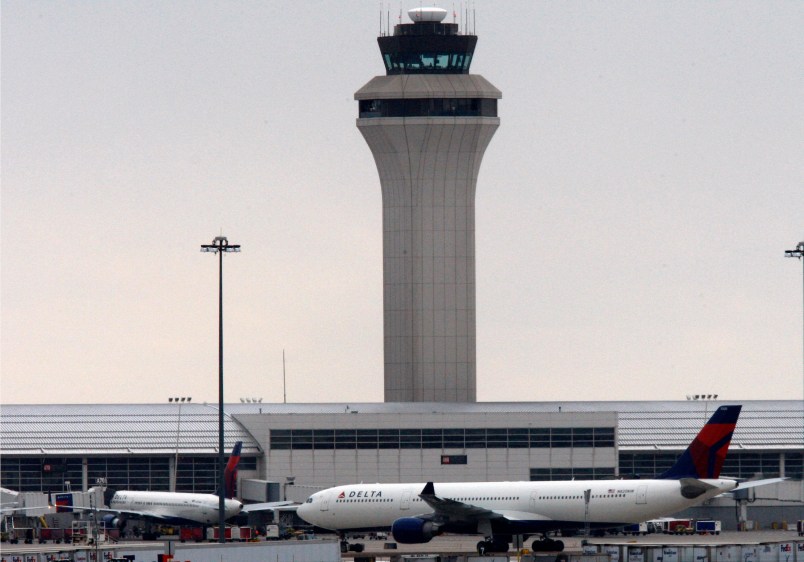WASHINGTON (AP) — Five air traffic controllers have exposed a problem that is putting planes at risk of colliding or accidents due to wake turbulence, a federal whistleblower protection office said Tuesday.
The problem occurs when pilots, air traffic control centers or airline dispatchers try to make changes to a flight plan by creating a second plan for the same flight, according to letters sent to the White House and Congress by the Office of Special Counsel, an independent agency.
The “pre-departure clearance” computer software designed to automate the filing and amending of flight plans and the delivery of departure clearances isn’t capable of flagging or identifying multiple plans that have been filed for the same flight, the letters said. This can result in a controller clearing a flight for departure based on an outdated plan, and the pilots flying a route not anticipated or planned for by the controller.
To try to catch the problem, controllers have to go through the time-consuming process of reviewing flights plans, calling pilots and searching through paper strips that are passed among controllers and marked to track a plane’s progress from taxing to takeoff. Then they compare the information on the paper strips to data displayed on computers.
The Federal Aviation Administration confirmed the problem in December 2014 and revived a working group to address the matter, the counsel’s office said in a statement.
But audits in April and July confirm that problem still remains, the counsel’s office said.
The controllers who blew the whistle on the problem work at the Detroit Metropolitan Airport in Romulus, Mich. But the problem affects air traffic nationwide.
“The investigation found that air traffic control facilities across the national airspace system are encountering this problem on a regular basis, and that it is significantly more common during inclement weather periods,” said Special Counsel Carolyn Lerner.
Airlines are more likely to make multiple revisions in flight plans during bad weather. Those also tend to be periods when controllers have a heavier than normal workload.
“The whistleblowers in Detroit deserve our deep gratitude,” said Lerner. “While more work needs to be done, their actions reignited efforts to address the problems.”
In 2012, the FAA created a working group to address the problem of multiple flight plans. However, the counsel’s office said FAA officials have acknowledged the group “had little impact.” The agency also told the counsel’s office that senior officials either were not aware of, or did not perceive, the significance of the problem.
Vincent Sugent, one of the controllers who reported the problem to the counsel’s office, said controllers have been complaining to FAA officials about the problem for about seven or eight years. The National Air Traffic Controllers Association also raised the problem with the agency, he said.
“They (FAA officials) admitted the problem multiple times,” he said in an interview. “But they were just really slow. They weren’t acting quickly enough.”
Just recently, controllers in Detroit cleared a small airliner for takeoff using a flight plan that said the plane was to head west, Sugent said. It wasn’t until after takeoff that controllers discovered a second flight plan had been filed by the airline’s dispatchers calling for the plane to head east, which is the direction pilots took, he said.
Incidents like that typically happen once or twice a week in Detroit, he said.
Controllers also disclosed other problems with the pre-departure clearance system, including erroneous alerts and notifications, Lerner said in her letters. Sometimes the system displays revision alerts when no changes have been made, a flight doesn’t exist, or it’s already departed, she said.
An FAA spokeswoman had no immediate comment.
___
Follow Joan Lowy on Twitter at http://www.twitter.com/AP_Joan_Lowy
Copyright 2015 The Associated Press. All rights reserved. This material may not be published, broadcast, rewritten or redistributed.







Yet another reason to dislike flying.
Wake Turbulence, in case it isn’t clear, is caused by vortexes that spin off the tips of airplane wings, particularly the wings of big, heavy planes during takeoff and landing when they are flying more slowly and at high angles of attack. Think of a horizontal tornado stretching back, outwards, and downwards from each wing tip, for several hundred yards.
Pilots are trained to fly above or well to the side of the flight path of planes in front of them, so as to avoid the little tornadoes, but in inclement weather the tower has to help ensure that plane #2 doesn’t take off into the vortexes of plane #1 ahead of it.
I hit a wake vortex once. I was unamused.
Isn’t this just absurd in the era of Big Data? Paper strips? Really? I feel so safe now.
So why are airlines filing so many amended flight plans in the first place? Can they be discouraged from doing so while the database fixes are (very carefully) put in place?